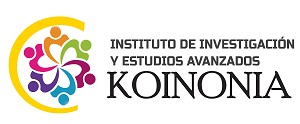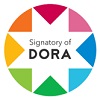Juegos cooperativos y competencias matemáticas en educación inicial: una revisión sistemática
Resumen
La investigación se llevó a cabo con el propósito de analizar la relación entre los juegos cooperativos y el desarrollo de competencias matemáticas en la educación inicial. Se acudió a una metodología de revisión sistemática y análisis documental mediante el método PRISMA, empleando los operadores booleanos OR y AND. Esto permitió identificar un total de 25 artículos pertenecientes a revistas indexadas. Los resultados indicaron que los juegos cooperativos constituyeron actividades recreativas diseñadas para grupos, cuyo enfoque mejoró competencias a través de la interacción social. Por otro lado, las competencias matemáticas fueron definidas como las habilidades necesarias para mantener y aplicar el conocimiento matemático de manera efectiva en la resolución de problemas. La investigación concluyó que los juegos cooperativos se perfilaron como estrategias altamente efectivas para potenciar las competencias matemáticas en la educación inicial, ya que permitieron optimizar las habilidades matemáticas de los estudiantes en entornos educativos
Descargas
Citas
Azhar, S., & Jalil, H. (2022). Comparison of Individual and collaborative game-based learning using tablet in improving students' knowledge in primary classroom environment. Asian Journal of University Education, 18(1), 205-216. https://n9.cl/he2t4
Azis, P., & Pertiwi, N. (2021). The Effect of Cooperative Learning Model Type Team Games Tournament (TGT) with Play Wheel Media on Students' Interest in Biology Education STKIP Pembangunan Indonesia. Journal of Physics: Conference Series, 1752(1), 31-39. https://n9.cl/8v1wl
Baek, Y., & Touati, A. (2020). Comparing collaborative and cooperative gameplay for academic and gaming achievements. Journal of Educational Computing Research, 57(8), 2110-2140. https://n9.cl/vbtui6
Bayeck, R. (2020). Examining board gameplay and learning: a multidisciplinary review of recent research. Simulation and Gaming, 51(4), 411-431. https://n9.cl/4y609
Cámara, A., Ruiz, A., Suárez, S., Cruz, R., & Martínez, E. (2023). Effect of an integrated active lessons programme through playful maths games on self-concept, self-esteem and social skills in preschool children. Behavioral Sciences, 13(3), 1-12. https://n9.cl/cxats
Cetin, I., Erlimit, A., Nabiyev, V., Karal, H., Kosa, T., & Kokoc, M. (2023). The effect of gamified adaptive intelligent tutoring system artibos on problem-solving skills. Participatory Educational Research, 10(1), 344-374. https://n9.cl/wzf24
De Jesús, A., & Silveira, I. (2022). A collaborative learning framework for computational thinking development through game programming. Informatics in Education, 21(2), 253-281. https://n9.cl/fj0su
Erikson, M., Kenward, B., Poom, L., & Stenberg, G. (2021). The behavioral effects of cooperative and competitive board games in preschoolers. Scandinavian Journal of Psychology, 62(3), 355-364. https://n9.cl/2ep24
Gutfleish, M., Schops, M., Sayin, S., Wende, F., & Sasse, M. (2022). Putting security on the table: The digitalization of security tabletop games and its challenging aftertaste. Proceedings - International Conference on Software Engineering, 1(1), 217-222. https://n9.cl/arewx
Ilhan, A. (2021). The impact of game-based, modeling, and collaborative learning methods on the achievements, motivations, and visual mathematical literacy perceptions. SAGE Open, 11(1), 31-39. https://n9.cl/7vwql
Kanber, H., Al, S., & Al, W. (2023). Recruitment of teachers for cooperative education in educational institutions. International Journal of Emerging Technologies in Learning, 18(3), 110-127. https://n9.cl/nixw1t
Kurniati, E., Mujahidin, A., Suciari, N., Hestari, S., & Susilo, H. (2021). STAD-jeopardy games: A strategy to improve communication and collaboration skills' mathematics pre-service teachers. AIP Conference Proceedings, 2330(2), 1-12. https://n9.cl/cbbog
Nurwahidayati, N., & Qohar, A. (2020). Students’ activeness in jigsaw type cooperative learning and rank 1 games on sets topic. Journal of Physics: Conference Series, 1657(1), 31-39. https://n9.cl/6q34o
Pham, V., Wawrzyniak, S., Cichy, I., Bronikowski, M., & Rokita, A. (2021). Brainballs program improves the gross motor skills of primary school pupils in Vietnam. International Journal of Environmental Research and Public Health, 18(3), 1-8. https://n9.cl/omdbx
Shahbari, J.; Daher, W.; Baya, N., & Jaber, O. (2020). Prospective teachers' development of meta-cognitive functions in solving mathematical-based programming problems with scratch. Symmetry, 12(9), 1-12. https://n9.cl/yt3xen
Taner, M.; Sahin, E., y Ergisi, A. (2020). The effect of play-based math activities on different areas of development in children 48 to 60 months of age. SAGE Open, 10(2), 1-31. https://n9.cl/r7doyw
Toope, T., Hardecker, S., & Haun, D. (2019). Playing a cooperative game promotes preschoolers’ sharing with third-parties, but not social inclusion. PLoS ONE, 14(8), 1-12. https://n9.cl/mbao0
Tsng, S., Shahrill, M., & Latif, S. (2021). Exploring the effects and students’ views on the use of a tic-tac-toe game to teach mathematics in Brunei Darussalam. International Journal of Science, Mathematics and Technology Learning, 29(1), 49-65. https://n9.cl/ah4gri
Ukobizaba, F., Nizeyimana, G., & Mukuka, A. (2021). Assessment strategies for enhancing students’ mathematical problem-solving skills: A review of literature. Eurasia Journal of Mathematics, Science and Technology Education, 17(3), 1-10. https://n9.cl/o5fslc
Van, S., Blom, N., & Van, A. (2022). The developmental influence of collaborative games in the grade 6 mathematics classroom. International Journal of Mathematical Education in Science and Technology, 53(6), 1478-1501. https://n9.cl/323y1
Vankus, P. (2021). Influence of game-based learning in mathematics education on students’ affective domain: A systematic review. Mathematics, 9(9), 12-19. https://n9.cl/tqos3
Veraska, A., Alsalnova, M., Bukhalenkova, D., Veraksa, N., & Liutsko, L. (2020). Assessing the effectiveness of differentiated instructional approaches for teaching math to preschoolers with different levels of executive functions. Education Sciences, 10(7), 1-16. https://n9.cl/ohpx5
Yusoff, A., Durairaj, K., Mohamed, R., Peng, F., Abdullah, N., Ismail, H., Salleh, S., & Wahid, Z. (2022). Communication in mathematics among school children: A systematic review. Journal of Advanced Research in Applied Sciences and Engineering Technology, 28(2), 275-290. https://n9.cl/95xp9
Zulfa, H., Saputro, D., & Riyadi, G. (2019). Students' difficulties in mathematics learning with artisan character type in HOTS trigonometry test. Journal of Physics: Conference Seri, 1321(2), 31-39. https://n9.cl/lzijj
Derechos de autor 2024 Carla Natalí Gutiérrez-Cueva, Yetzy Beatriz Guerra-Castellanos

Esta obra está bajo licencia internacional Creative Commons Reconocimiento-NoComercial-CompartirIgual 4.0.
CC BY-NC-SA : Esta licencia permite a los reutilizadores distribuir, remezclar, adaptar y construir sobre el material en cualquier medio o formato solo con fines no comerciales, y solo siempre y cuando se dé la atribución al creador. Si remezcla, adapta o construye sobre el material, debe licenciar el material modificado bajo términos idénticos.
OAI-PMH URL: https://cienciamatriarevista.org.ve/index.php/cm/oai














